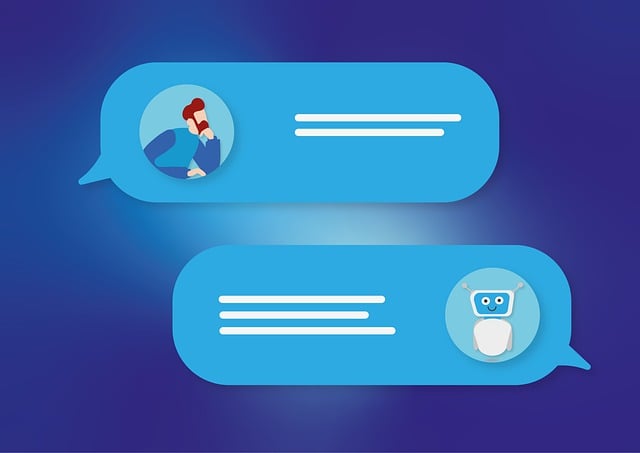The integration of AI chatbots and assistants into customer service is a transformative trend in the digital era, prioritizing personalized experiences. These tools utilize natural language processing for immediate responses and machine learning to anticipate client needs over time, enhancing satisfaction and efficiency. By analyzing user data, they enable tailored interactions, from product recommendations to adaptable communication styles. This approach drives loyalty and growth while continuously updating through learning algorithms. However, balancing personalization with privacy and addressing algorithmic bias is critical. Success is measured through KPIs like sales conversions, user engagement, and satisfaction, tracked via A/B testing and analytics.
In the digital age, AI chatbots and assistants are transforming customer service, offering unprecedented personalization. As businesses strive for competitive edge, understanding user journeys and tailoring experiences becomes paramount. This article explores how AI can be leveraged to create dynamic, personalized interactions, from enhancing customer support with intelligent agents to integrating seamless AI experiences into existing systems. We delve into ethical considerations and provide metrics for evaluating successful AI personalization strategies in the context of ai chatbot and ai assistant-driven customer service.
- The Rise of AI Chatbots and Assistants in Customer Service
- Understanding User Journeys and Personalization Needs
- Leveraging AI for Tailored Customer Experiences
- Integrating AI into Existing Customer Service Systems
- Ethical Considerations in AI Personalization
- Measuring Success: Evaluating AI Personalization Strategies
The Rise of AI Chatbots and Assistants in Customer Service

The rise of AI chatbots and assistants has transformed the landscape of customer service, revolutionizing how businesses interact with their clients. These advanced technologies are now at the forefront of delivering personalized experiences, quickly becoming an integral part of modern customer support strategies. With natural language processing capabilities, AI chatbots can understand and respond to customer inquiries in real-time, offering instant solutions and support.
AI assistants, powered by machine learning algorithms, have taken this a step further. They learn from each interaction, continuously improving their ability to anticipate and fulfill customer needs. Whether it’s providing product recommendations, handling simple queries, or even offering complex troubleshooting, these AI assistants enhance customer satisfaction by delivering precise and tailored service, all while reducing response times and operational costs for businesses.
Understanding User Journeys and Personalization Needs

In today’s digital landscape, understanding user journeys is paramount for businesses aiming to deliver exceptional experiences. A user journey encompasses every interaction a customer has with a brand, from initial awareness to post-purchase support. By mapping out these journeys, businesses can identify pain points and opportunities for enhancement. AI chatbots and assistants play a pivotal role in this process by collecting and analyzing user data, enabling personalized interactions that cater to individual needs and preferences.
Personalization goes beyond simple product recommendations. An AI-driven customer service approach allows for tailored support, where an AI assistant can adapt its communication style and problem-solving methods based on user behavior and history. This level of personalization not only improves customer satisfaction but also fosters loyalty by making users feel valued and understood. Moreover, continuous learning algorithms ensure that the AI chatbot or assistant evolves with user trends, providing relevant and up-to-date assistance throughout the entire journey.
Leveraging AI for Tailored Customer Experiences

In today’s digital landscape, leveraging AI for tailored customer experiences has become paramount. Advanced AI chatbots and assistants are transforming how businesses interact with their customers by offering personalized responses and recommendations in real-time. These intelligent systems can analyze vast amounts of data to understand individual preferences, behaviors, and needs, thereby creating unique user journeys. By integrating AI customer service into their strategies, companies can enhance customer satisfaction, build stronger relationships, and drive business growth.
AI chatbots and assistants provide 24/7 availability, instant responses, and consistent quality of service. They can adapt to individual users, offering customized support that goes beyond generic solutions. This level of personalization not only improves the user experience but also empowers businesses to deliver targeted marketing campaigns and product recommendations, fostering customer loyalty and increasing sales.
Integrating AI into Existing Customer Service Systems

Integrating AI into existing customer service systems has become a game-changer in enhancing user experiences and optimizing operations. AI chatbots and assistants are now seamlessly embedded in various platforms, enabling round-the-clock support for customers worldwide. These intelligent agents leverage natural language processing (NLP) to understand and respond to queries accurately, handling simple tasks and directing complex issues to human agents when needed.
By integrating AI customer service, businesses can streamline their support processes, reduce response times, and deliver personalized interactions at scale. Moreover, AI analytics provide valuable insights into customer preferences and pain points, allowing for proactive issue resolution and tailored recommendations. This level of personalization fosters stronger customer relationships and boosts overall satisfaction.
Ethical Considerations in AI Personalization

As AI chatbots and assistants become increasingly integrated into customer service, it’s crucial to consider the ethical implications of personalization. While tailoring user experiences based on data can enhance satisfaction and retention, it also raises privacy concerns. Organizations must be transparent about data collection practices and ensure users have control over their information. Misuse or unauthorized access to personal details could lead to serious consequences, including identity theft and targeted manipulation.
Additionally, algorithmic bias is a significant challenge in AI personalization. If training data reflects societal biases, the system may inadvertently reinforce them, leading to unfair outcomes. For instance, an AI customer service agent might exhibit gender or racial prejudice if not carefully trained and monitored. Ensuring fairness and mitigating these biases require ongoing evaluation and adjustments to algorithms, as well as diverse teams involved in development and oversight to bring different perspectives and identify potential issues early on.
Measuring Success: Evaluating AI Personalization Strategies

Measuring success is a critical aspect of evaluating AI personalization strategies. Key performance indicators (KPIs) should be set to align with business objectives and customer expectations. For instance, increased sales conversions, higher user engagement, and improved customer satisfaction are common metrics used to gauge the effectiveness of AI-driven personalization. These KPIs can be tracked through A/B testing, user feedback, and analytics tools that provide insights into user behavior changes post-personalization implementation.
When assessing an AI chatbot or assistant’s performance, it’s essential to consider not only direct sales impacts but also indirect benefits like improved customer retention and reduced support costs due to efficient problem resolution. Advanced analytics can help identify patterns in user interactions, allowing businesses to refine their personalization strategies over time. This iterative process ensures that AI customer service remains effective and relevant in a dynamic market.
